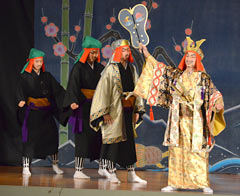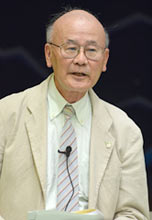Okinawan pronunciation added in Kumiodori play script

On November 16 at the Yaese Town Central Hall, junior high-school students performed kumiodori entirely in Uchinaguchi.
November 22, 2013 Ryukyu shimpo
Uchinaguchi (Okinawan language) has words that cannot be pronounced using the 50 Japanese syllabary. In this respect, the difficulty of using the Japanese writing system to read Uchinaguchi aloud has limited the spread of the language and passing it on to the next generation. In seeking solutions, Okinawan language researchers have created a special play script using the 50 Japanese syllabary plus 23 more Okinawan characters. Kochinda Junior High School in Yaese Town experimented with the script in their kumiodori class. On November 16 at the Town Hall, the students performed the kumiodori called Migawari chujo, which is set in Yaese Town.
Yaese Town Board of Education member Takeshi Kamiya, who is also a kumiodori actor, had found an easy-to-follow script, which he suggested that the school try with its Okinawan characters. Shinsei Kuniyoshi, of the Tokyo Branch of the Association for Okinawan Languages, wrote the script and Funazu Yoshiaki, a friend of Kuniyoshi, designed the Okinawan characters about 30 years ago.
The students started rehearsing the play in July. At the beginning, they thought that the script with the Japanese syllabary was difficult to understand because it was in hiragana, but in September, Kuniyoshi wrote a new script and visited students to teach them the pronunciation. The new script made all the difference. One of the students said, “It was easy to read.” Another said, “I learned the rhythm of Uchinaguchi.”
Several Okinawan writing systems have been created in the past. In this play’s script, one character represents one sound rather than being expressed by two or even three hiragana characters. Kuniyoshi explained, “It is difficult to understand and memorize lines if you read them using the existing notation. I made it easier for the students to read it aloud.”
At the performance the students proudly delivered their lines entirely in Uchinaguchi. One of them, Yudai Miyagi, said, “Losing Uchinaguchi speakers is a serious problem. We want to pass the language on to the next generation.” The performance included a lecture by Kuniyoshi and a professional dance.
(English translation by T&CT, Megumi Chibana and Mark Ealey)
Previous Article:Okinawa Shogaku wins Meiji Jingu baseball title
Next Article:[Editorial]Nago mayor’s written opinion reveals injustices of Henoko landfill
[Similar Articles]
- Gishi publishes Uchinaguchi version of Soseki’s I am a Cat
- Let’s sing Uchinaguchi
- Japan Times reporter writes about the current state of affairs for the Okinawan dialect
- LA Times article about an Okinawan attempting to keep Okinawan language alive
- Students in Uruma perform the modern kumiodori play at the world heritage site Katsuren Castle

 Webcam(Kokusai Street)
Webcam(Kokusai Street)


